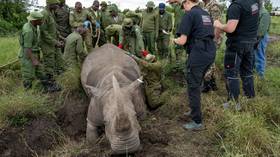Scientists create new embryos to save African mammal

A team of scientists working in Kenya announced on Monday that five new embryos have been created to save Africa’s northern white rhino from extinction.
BioRescue, the research consortium in charge of the project, said 18 eggs were collected from a female named Fatu in May and fertilized with sperm from two different bulls to improve “genetic diversity.”
Fatu and her mother, Najin, are the world’s two remaining northern white rhinos and live on Kenya’s 90,000-acre Ol Pejeta wildlife conservancy, which is under poacher protection.
The northern white rhino subspecies was declared functionally extinct in 2018 following the death of the last male, Sudan.
“Four years since the start of this ambitious project to save the Northern White Rhino from extinction, the BioRescue consortium has made significant progress towards its ultimate aim,” BioRescue said in a statement.
The latest effort by the consortium has yielded the highest number of embryos from any egg collection since the onset of the project.
“Previous procedures in November 2022 and February 2023 yielded two and zero embryos, respectively,” it stated.
So far, 29 fertilized eggs have been created using advanced assisted reproduction technologies and have been cryopreserved, a process that keeps them at low temperatures for future transfer to surrogate mothers.
The consortium said its scientists have identified two wild southern white rhino females as potential surrogate mothers, as both Fatu and Najin are unable to carry a pregnancy to full term.
The project is a collaborative effort, with scientists from the Leibniz Institute in Berlin assisting the Kenya Wildlife Service and Ol Pejeta, and the Italian Avantea Laboratory providing fertilization support. It is mainly funded by the German Federal Ministry of Education and Research.
Kenya’s Ol Pejeta Conservancy called the development “fantastic news” and commended the team for its “phenomenal dedication and hard work that have made this all possible.”














